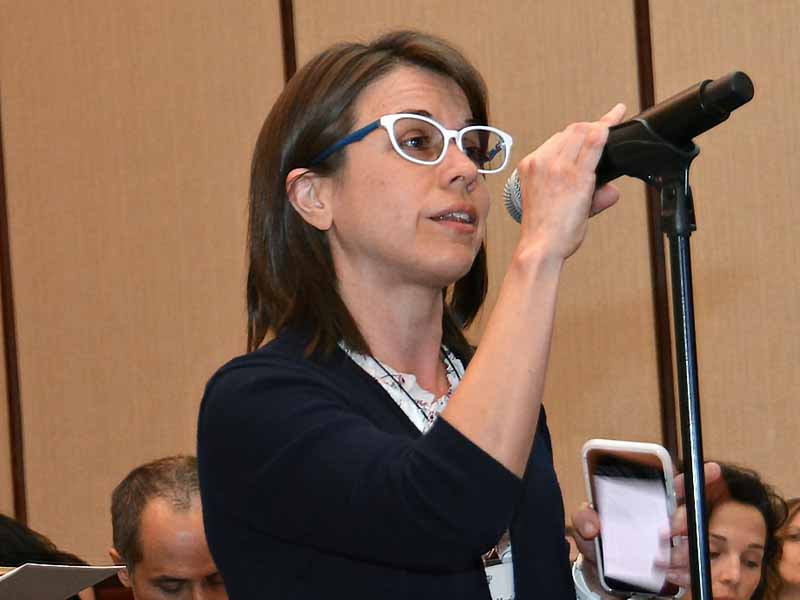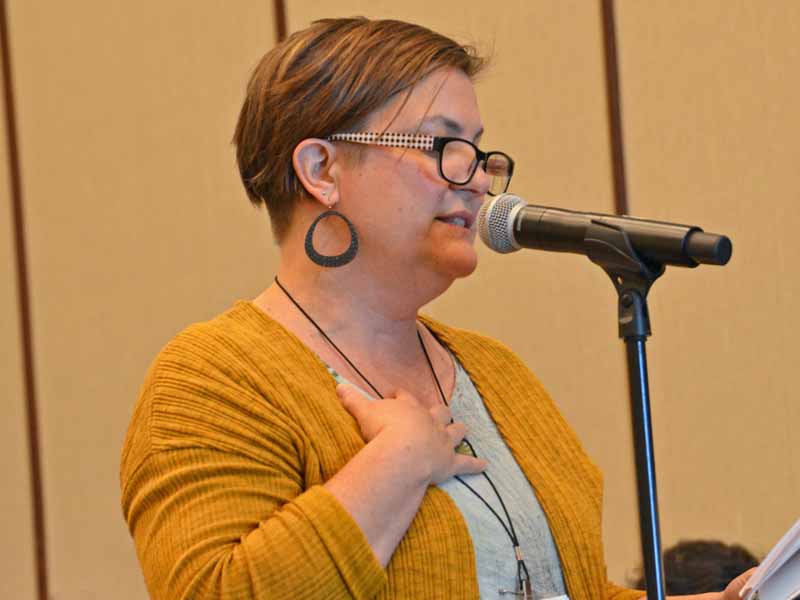Family Physicians Go Big With Advocacy Agenda
May 03, 2019 10:59 am Scott Wilson Kansas City, Mo. – (Editor's note: This story has been updated with a link to the full "Healthy Harbors for All Californians" toolkit.)
"Physicians should lead this issue," said multiple family physicians about several ambitious resolutions that were considered by the Reference Committee on Advocacy during the 2019 National Conference of Constituency Leaders that was held here April 25-27.

During this year's National Conference of Constituency Leaders, Maria Colon-Gonzalez, M.D., a general registrant from Edinburg, Texas, testifies before the Reference Committee on Advocacy about the unique challenges of providing care for refugees and asylum-seekers.
AAFP members from the five constituency groups -- women, minorities, new physicians, international medical graduates, and LGBT physicians and those who support LGBT issues -- discussed a number of advocacy-related resolutions during the reference committee hearing on April 26 and the business session the following morning.
Student Debt
A resolution asking for action to address family physicians' medical school debt burden generated a chorus of approval during the reference committee hearing.
Juliann Barrett, D.O., a women's delegate from Grantham, N.H., said, "I don't have student loans because I did the military program. But there's a loan interest limit for military members, part of the Servicemembers Civil Relief Act, that caps rates. Why couldn't we do the same for people who go into primary care? If we could negotiate lower rates, that could help with the tremendous debt that physicians have coming out of residency."
Delegates adopted a resolution calling for the AAFP to seek collaboration with financial institutions on loan consolidation programs "geared toward lowering the interest rate on privately funded student loans" for practicing family physicians.
It also asked the Academy to advocate for legislation supporting similar consolidation and interest-reduction programs for federal loans.
Story Highlights
Protecting International Medical Graduates
Delegates also adopted a resolution, with amendments, asking the AAFP to advocate that per-country numerical limits on permanent residency status for highly skilled, employment-based immigrants be eliminated. It also asked the Academy to work with the AMA and the Society of Hospital Medicine toward eliminating country-specific, employment-based immigration limits.
Sukhjeet Kamboj, M.D., an IMG delegate from Lebanon, Pa., said during the business session, "I'm speaking to this as a parent, a mother and a physician. This is important to me because it affected my family. I came to the U.S. in 2007, when my kids were 7 and 9. They went to elementary school here but couldn't go to college because they weren't citizens. They went back to Canada.
"I don't want any Academy member to face the problems I faced. I worked an underserved constituency, did my part as a family physician, and I do deserve to, in this process, get some help from the AAFP."
Leila Hesselson, M.D., an LGBT delegate from Concord, N.H., said, "When we talk about not having enough primary care physicians, part of the issue is that we have immigrant physicians, people who are highly skilled, who are work-restricted by their visas. They can work for only one employer at a time."
Megan Guffey, M.D., M.P.H., a women's delegate from Manson, Wash., added, "I think this is a fight worth having. We have some 25% of Academy members who are immigrants. We are coming from a place of privilege, and we need to check that and understand how important this is for our colleagues."
Single-payer Model
Kevin Bernstein, M.D., a general registrant from Jacksonville, Fla., supported a resolution asking the AAFP to express preference for the single-payer model. Referring to the U.S. military, he said, "I practice in a single-payer system. Our congresspeople get care in our single-payer system. It's not the best system, but we are all taken care of and it works.

Nicole Chaisson, M.D., M.P.H., a women's delegate from Minneapolis, testifies before the reference committee in support of a resolution she co-authored that opposes criminalization of physicians who provide full-scope family planning services, including abortion care.
"As someone who cares about people, I think this is the right thing to do."
Daniel Neghassi, M.D., a minority delegate from New York City, spoke in favor of the measure, as well. At the microphone during the business session, he told the story of a patient who was brought to him by a concerned neighbor.
"Sometimes medicine is not that complicated," Neghassi said. "This man just needed insulin. It should have been easy. But getting him that medicine was a burden, and we go through this all the time.
"If we had single payer, we could just take care of him. We should all be taking care of each other. "
However, Erika Roshanravan, M.D., a general registrant from Davis, Calif., expressed concern about the resolution's wording.
"We don't want to be left aside because we only want single payer," she said.
The resolution was amended to refer to single payer as "the preferred system among others studied" and referred to the Congress of Delegates.
Other Business
Delegates adopted several additional resolutions or substitute resolutions considered by the reference committee that addressed actions such as
- adopting the California AFP toolkit "Healthy Harbors for All Californians" to assist family physicians in caring for immigrant families and families separated at borders;
- affirming the safety and legality of abortion, supporting the right of family physicians to provide medication abortions with mifepristone in general family practices, and opposing legislation that restricts access to or criminalizes abortion care;
- collaboration with state chapters that request assistance with advocacy against interference in the teaching and training of medical students and residents in the practice of evidence-based medical services;
- reaffirmation of the Academy's policy on preventing gun violence;
- supporting paid leave for new parents, including family physicians and residents;
- supporting a system of health care that is "financially sustainable regardless of politics and free from undue influence from commercial entities"; and
- expanding legislation that protects breast- or chest-feeding parents to all employment fields.
Related AAFP News Coverage
2019 NCCL
FPs Hammer Out Practice-related Measures for AAFP to Take Up
(5/1/2019)
2019 NCCL
Delegates Focus on Race in Medicine, Gender-affirming Care
(5/1/2019)
2019 NCCL
Member Constituency Delegates Reject Purity Politics for PAC
(4/30/2019)
2019 AAFP Leadership Conference
Family Physicians Voice Questions at Town Hall Meeting
(4/30/2019)
2019 NCCL Delegates Elect New Leaders
(4/27/2019)
2019 NCCL
Family Physicians Learn to Say 'Yes, And …'
(4/26/2019)